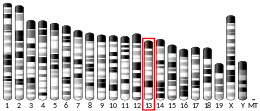GPX5
Glutathione peroxidase 5 (GPx-5), also known as epididymal secretory glutathione peroxidase is an enzyme that in humans is encoded by the GPX5 gene.[5][6]
GPx-5 belongs to the glutathione peroxidase family. It is specifically expressed in the epididymis in the mammalian male reproductive tract, and is androgen-regulated. Unlike mRNAs for other characterized glutathione peroxidases, this mRNA does not contain a selenocysteine (UGA) codon. Thus, the encoded protein is selenium-independent, and has been proposed to play a role in protecting the membranes of spermatozoa from the damaging effects of lipid peroxidation and/or preventing premature acrosome reaction. Alternatively spliced transcript variants encoding different isoforms have been described for this gene.[5]
References
- ENSG00000224586 GRCh38: Ensembl release 89: ENSG00000257770, ENSG00000224586 - Ensembl, May 2017
- GRCm38: Ensembl release 89: ENSMUSG00000004344 - Ensembl, May 2017
- "Human PubMed Reference:". National Center for Biotechnology Information, U.S. National Library of Medicine.
- "Mouse PubMed Reference:". National Center for Biotechnology Information, U.S. National Library of Medicine.
- "Entrez Gene: glutathione peroxidase 5 (epididymal androgen-related protein)".
- Hall L, Williams K, Perry AC, Frayne J, Jury JA (July 1998). "The majority of human glutathione peroxidase type 5 (GPX5) transcripts are incorrectly spliced: implications for the role of GPX5 in the male reproductive tract". Biochem. J. 333 (1): 5–9. doi:10.1042/bj3330005. PMC 1219548. PMID 9639555.
Further reading
- Talmud PJ, Drenos F, Shah S, et al. (2009). "Gene-centric association signals for lipids and apolipoproteins identified via the HumanCVD BeadChip". Am. J. Hum. Genet. 85 (5): 628–42. doi:10.1016/j.ajhg.2009.10.014. PMC 2775832. PMID 19913121.
- Mungall AJ, Palmer SA, Sims SK, et al. (2003). "The DNA sequence and analysis of human chromosome 6". Nature. 425 (6960): 805–11. Bibcode:2003Natur.425..805M. doi:10.1038/nature02055. PMID 14574404.
- Perry AC, Jones R, Niang LS, et al. (1992). "Genetic evidence for an androgen-regulated epididymal secretory glutathione peroxidase whose transcript does not contain a selenocysteine codon". Biochem. J. 285 (3): 863–70. doi:10.1042/bj2850863. PMC 1132876. PMID 1386734.
- Richard MJ, Guiraud P, Didier C, et al. (2001). "Human immunodeficiency virus type 1 Tat protein impairs selenoglutathione peroxidase expression and activity by a mechanism independent of cellular selenium uptake: consequences on cellular resistance to UV-A radiation". Arch. Biochem. Biophys. 386 (2): 213–20. doi:10.1006/abbi.2000.2197. PMID 11368344.
- Opalenik SR, Ding Q, Mallery SR, Thompson JA (1998). "Glutathione depletion associated with the HIV-1 TAT protein mediates the extracellular appearance of acidic fibroblast growth factor". Arch. Biochem. Biophys. 351 (1): 17–26. doi:10.1006/abbi.1997.0566. PMID 9501919.
- Hartley JL, Temple GF, Brasch MA (2000). "DNA cloning using in vitro site-specific recombination". Genome Res. 10 (11): 1788–95. doi:10.1101/gr.143000. PMC 310948. PMID 11076863.
- Rejraji H, Vernet P, Drevet JR (2002). "GPX5 is present in the mouse caput and cauda epididymidis lumen at three different locations". Mol. Reprod. Dev. 63 (1): 96–103. doi:10.1002/mrd.10136. PMID 12211066. S2CID 8103049.
- Ota T, Suzuki Y, Nishikawa T, et al. (2004). "Complete sequencing and characterization of 21,243 full-length human cDNAs". Nat. Genet. 36 (1): 40–5. doi:10.1038/ng1285. PMID 14702039.
- Choi J, Liu RM, Kundu RK, et al. (2000). "Molecular mechanism of decreased glutathione content in human immunodeficiency virus type 1 Tat-transgenic mice". J. Biol. Chem. 275 (5): 3693–8. doi:10.1074/jbc.275.5.3693. PMID 10652368.
- Kimura K, Wakamatsu A, Suzuki Y, et al. (2006). "Diversification of transcriptional modulation: large-scale identification and characterization of putative alternative promoters of human genes". Genome Res. 16 (1): 55–65. doi:10.1101/gr.4039406. PMC 1356129. PMID 16344560.
- Strausberg RL, Feingold EA, Grouse LH, et al. (2002). "Generation and initial analysis of more than 15,000 full-length human and mouse cDNA sequences". Proc. Natl. Acad. Sci. U.S.A. 99 (26): 16899–903. Bibcode:2002PNAS...9916899M. doi:10.1073/pnas.242603899. PMC 139241. PMID 12477932.
- Vernet P, Faure J, Dufaure JP, Drevet JR (1997). "Tissue and developmental distribution, dependence upon testicular factors and attachment to spermatozoa of GPX5, a murine epididymis-specific glutathione peroxidase". Mol. Reprod. Dev. 47 (1): 87–98. doi:10.1002/(SICI)1098-2795(199705)47:1<87::AID-MRD12>3.0.CO;2-X. PMID 9110319.
- Price TO, Ercal N, Nakaoke R, Banks WA (2005). "HIV-1 viral proteins gp120 and Tat induce oxidative stress in brain endothelial cells". Brain Res. 1045 (1–2): 57–63. doi:10.1016/j.brainres.2005.03.031. PMID 15910762. S2CID 7362454.
- Williams K, Frayne J, Hall L (1998). "Expression of extracellular glutathione peroxidase type 5 (GPX5) in the rat male reproductive tract". Mol. Hum. Reprod. 4 (9): 841–8. doi:10.1093/molehr/4.9.841. PMID 9783843.
- Bailey SD, Xie C, Do R, et al. (2010). "Variation at the NFATC2 locus increases the risk of thiazolidinedione-induced edema in the Diabetes REduction Assessment with ramipril and rosiglitazone Medication (DREAM) study". Diabetes Care. 33 (10): 2250–3. doi:10.2337/dc10-0452. PMC 2945168. PMID 20628086.
- Moyer AM, Sun Z, Batzler AJ, et al. (2010). "Glutathione pathway genetic polymorphisms and lung cancer survival after platinum-based chemotherapy". Cancer Epidemiol. Biomarkers Prev. 19 (3): 811–21. doi:10.1158/1055-9965.EPI-09-0871. PMC 2837367. PMID 20200426.




